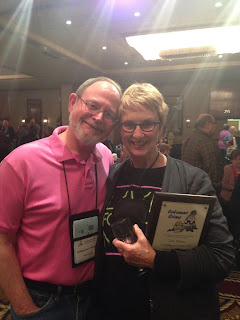Terry Shames here, answer the ongoing questions: The buzz of your first novel has long worn off, you’re no longer the hot new thing — now what?
I was indeed a “hot new thing” in 2013 when my first novel came out. How did I know I was hot? At my first Malice Domestic, just before the novel came out, guest speaker Carolyn Hart mentioned A Killing at Cotton Hill as the best debut book she’d read that year. I was dumbstruck.
Her comment started buzz, and it continued for the next year, as the book got rave reviews, was on the Baker and Taylor best seller list, and was nominated for several awards, including the coveted Strand Critics Award.
And the buzz didn’t slow down the next year when was also well-reviewed and nominated for awards for The Last Death of Jack Harbin.
I basked. I gloried. I received fan mail—which is what really gobsmacked me; (who were those strangers who sent me email, gushing over my latest book?)
When I asked bookstores if I could do a reading, they said yes!
I got to hobnob with other authors I admired tremendously.
My whole life I wanted to get a book published. That’s all. It wasn’t in my bucket list to win awards and to achieve the coveted “buzz.”
The buzz continued through the next few books, and I sort of got used to the excitement that greeted each new book.
But then, a little worm entered the scene. According to my agent, “now what?” meant writing a so-called breakout novel. In fact, that’s the advice I received again and again. Except for a few seasoned people, who seemed happy with being series writers, most authors I knew had written a breakout novel that boosted them to new heights. Or in some cases, authors were still aiming for the breakout.
I was perfectly happy writing my Samuel Craddock series, but I did have ideas for other books. The question for me was, were any of them breakout novel ideas? Apparently not. I’ve been sent back to the drawing board numerous times on each of four non-Craddock novels that I’ve written in the past few years.
The only novels I never seem to have trouble writing are the Craddock ones. And as much as fans love them, my base has never grown past a few thousand readers. So instead of “write a breakout novel,“ my “now what” may be, “how do I grow my fan base?” And that’s tricky. I’ve received starred reviews from all the big reviewers, won awards, been nominated for numerous awards, been reviewed in major newspapers more than once, been on TV, been interviewed in magazines, and been awarded Bookbubs. I’ve had arguably the best publicist. And yet, my fan base remains stubbornly level.
I think “now what?”, in my case has to be “keep plugging away.” Continue to try to improve my craft, listen to good advice, and pay attention to critiques. But the single most important “now what?” is to have fun. That’s not always easy. A writer I admire tremendously posted on Facebook today that he is facing the blank page for the 16th time with the certainty that’s he a fake. Joe Clifford is no fake.
And the fact that he thinks he is when he starts on a new novel gives me heart. If he faces the blank page with trepidation the same way I do, maybe one day I’ll succeed with that breakout novel. At the very least, I’ll continue to enjoy writing my series.







5 comments:
Great piece, thank you Terry. I love the reminder dear to have fun. That you keep striving and pushing is inspirational. In the words of James Lee Burke, awards and buzz are “yesterday’s boxscore.” I look forward to whatever comes from your mind onto the page.
Thank you, Josh. I have to remind myself of that sometimes!
Candid and honest. Thanks Terry. I too remind myself that while I want more readers, What I want more is to enjoy writing and polish my craft.
I recall Margaret Atwood saying she was glad she became famous in her eighties because she could see fame for what it was, a fleeting phenomenon ( my words).
Yup and yup. I read enough of the-book-after-the-breakout-books in 2020 to tell you it isn't always a stairway to much except a larger advance that makes it harder to earn out your advance! A lot of pressure. Not to say don't try, but I think the goalposts just keep moving.
Susan, I love that--the goalposts keep moving. And Ellen, that's a good thought from Margaret Atwood by way of you.
Post a Comment